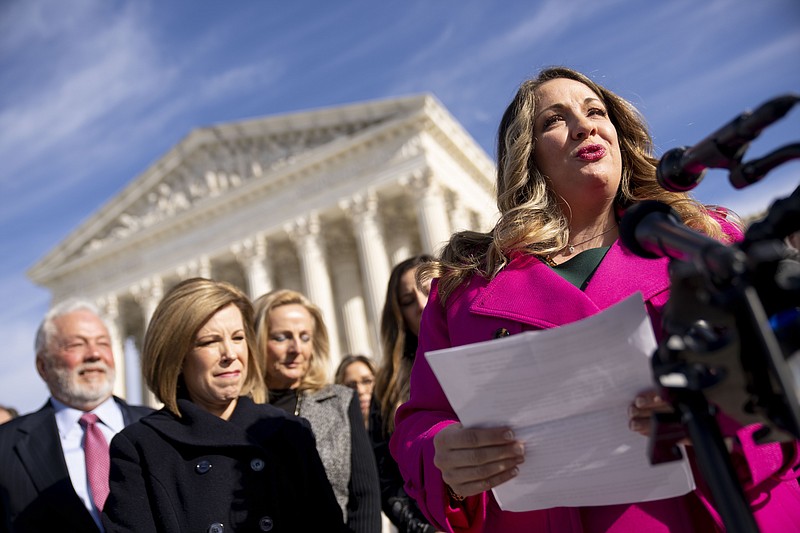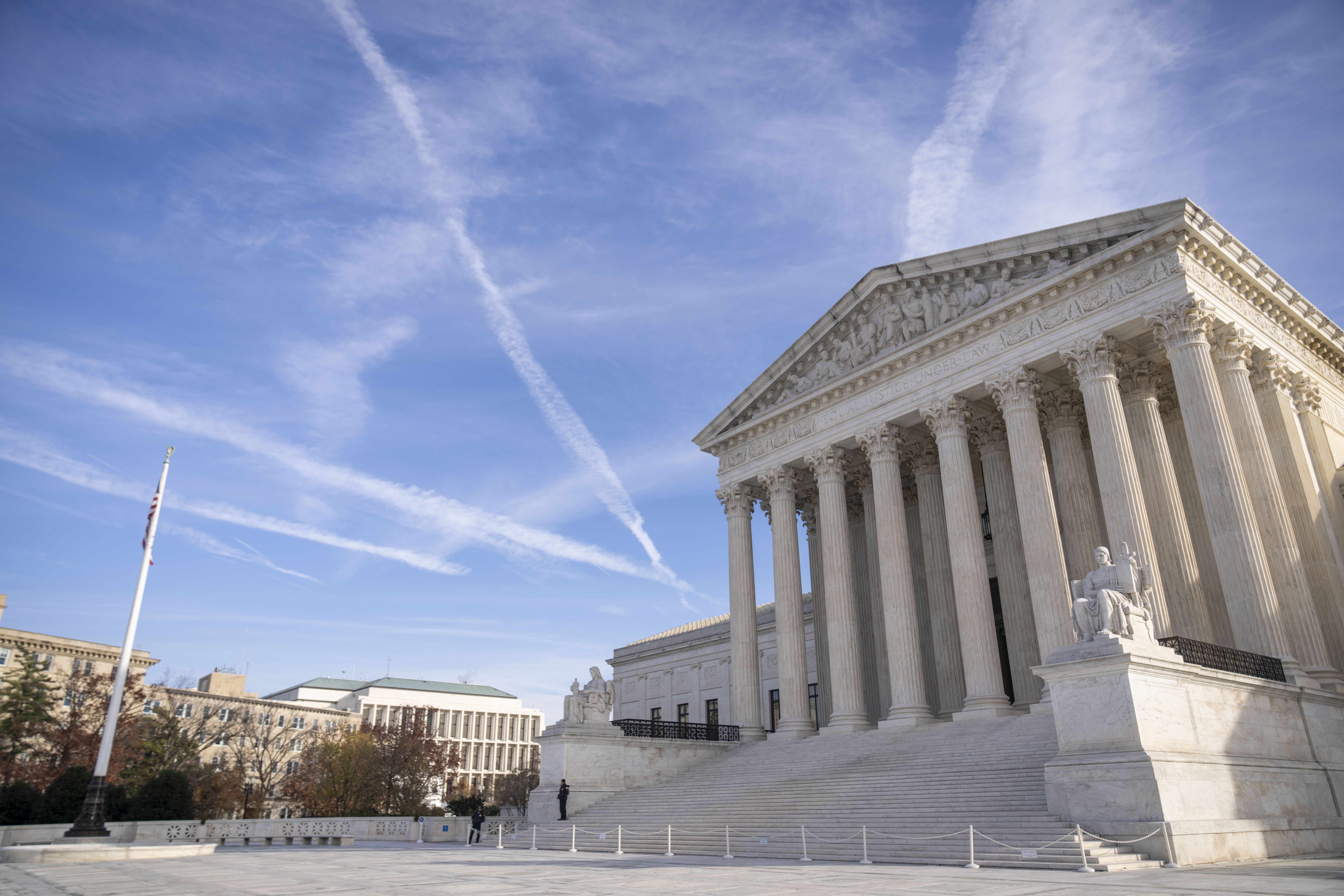WASHINGTON (AP) -- The Supreme Court's conservative majority sounded sympathetic Monday to a Christian graphic artist who objects to designing wedding websites for gay couples, the latest collision of religion and gay rights to land at the high court.
The designer and her supporters say that ruling against her would force artists -- from painters and photographers to writers and musicians -- to do work that is against their beliefs. Her opponents, meanwhile, say that if she wins, a range of businesses will be able to discriminate, refusing to serve Black, Jewish or Muslim customers, interracial or interfaith couples or immigrants.
Over more than two hours of spirited arguments, the justices repeatedly tested out what ruling for the designer could mean, using detailed and sometimes colorful hypothetical scenarios. Those included a Black Santa asked to take a picture with a child dressed in a Ku Klux Klan outfit, a photographer asked to take pictures for the marital infidelity website Ashley Madison, and an invented food business called "Grandma Helen's Protestant Provisions."
The case comes at a time when the court is dominated 6-3 by conservatives and follows a series of cases in which the justices have sided with religious plaintiffs. Across the street from the court, meanwhile, lawmakers in Congress are finalizing what would be a landmark bill protecting same-sex marriage, legislation prompted by a different high court case from earlier this year.
During arguments Monday the court's three liberal justices expressed concerns about ruling for website designer and graphic artist Lorie Smith while conservatives suggested support for her.
Justice Neil Gorsuch, one of three high court appointees of former President Donald Trump, described Smith as "an individual who says she will sell and does sell to everyone, all manner of websites, (but) that she won't sell a website that requires her to express a view about marriage that she finds offensive."
Smith, who is based in Colorado, doesn't currently create wedding websites. She wants to but says her Christian faith prevents her from creating websites celebrating same-sex marriages.
Colorado, like most other states, has what's called a public accommodation law that says if Smith offers wedding websites to the public, she must provide them to all customers. Businesses that violate the law can be fined, among other things.
Smith says the law violates her First Amendment rights. The state disagrees.
A looming question during Monday's arguments: At what point does an objection to serving someone cross the legal line?
Justice Ketanji Brown Jackson, one of the court's three liberals, asked whether a photography store in a shopping mall could refuse to take pictures of Black people on Santa's lap.
"Their policy is that only white children can be photographed with Santa in this way, because that's how they view the scenes with Santa that they're trying to depict," said Jackson, one of the court's two Black justices.
Conservative Justice Samuel Alito, who seemed to favor Smith, asked whether it's "fair to equate opposition to same-sex marriage to opposition to interracial marriage." And he pointed to language in the court's 2015 opinion declaring a nationwide right to same-sex marriage about "honorable people who object to same-sex marriage."
Alito was also the justice who asked whether a Black person dressed as Santa could refuse to take a picture with a child dressed in a Ku Klux Klan outfit. Eric Olson, arguing on behalf of Colorado, responded "No," because Ku Klux Klan outfits wouldn't be protected under public accommodation laws.
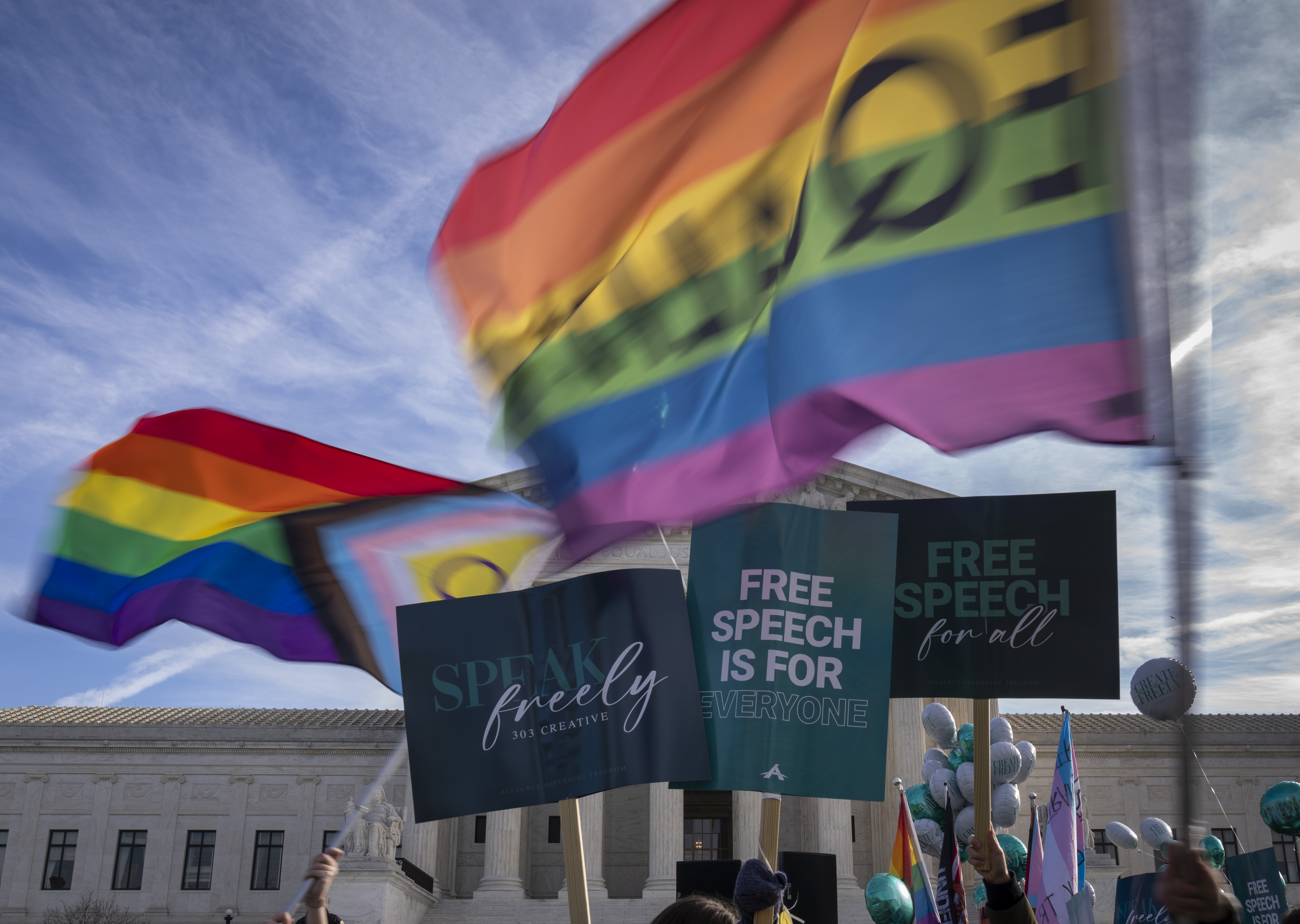 People on both sides of the debate rally outside the Supreme Court in Washington, Monday, Dec. 5, 2022. The Supreme Court is hearing the case of a Christian graphic artist who objects to designing wedding websites for gay couples, that's the latest clash of religion and gay rights to land at the highest court. (AP Photo/Andrew Harnik)
People on both sides of the debate rally outside the Supreme Court in Washington, Monday, Dec. 5, 2022. The Supreme Court is hearing the case of a Christian graphic artist who objects to designing wedding websites for gay couples, that's the latest clash of religion and gay rights to land at the highest court. (AP Photo/Andrew Harnik) Lorie Smith, a Christian graphic artist and website designer in Colorado, center in pink, walks out of the Supreme Court in Washington, Monday, Dec. 5, 2022, after her case was heard before the Supreme Court. The Supreme Court is hearing the case of Smith who objects to designing wedding websites for gay couples, that's the latest clash of religion and gay rights to land at the highest court. (AP Photo/Andrew Harnik)
Lorie Smith, a Christian graphic artist and website designer in Colorado, center in pink, walks out of the Supreme Court in Washington, Monday, Dec. 5, 2022, after her case was heard before the Supreme Court. The Supreme Court is hearing the case of Smith who objects to designing wedding websites for gay couples, that's the latest clash of religion and gay rights to land at the highest court. (AP Photo/Andrew Harnik)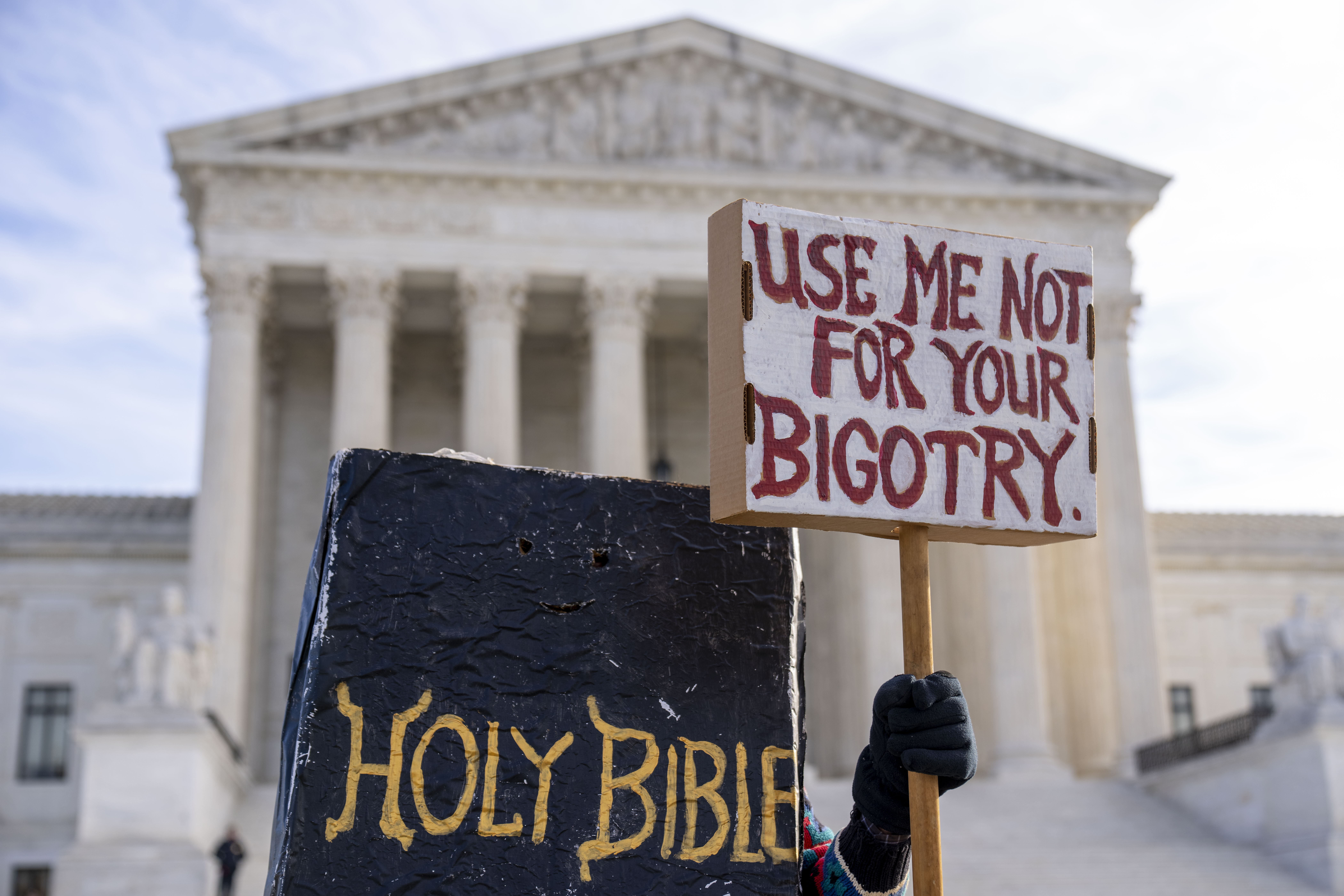 A person dressed as a bible holds a sign that reads "Use Me Not For Your Bigotry" outside the Supreme Court in Washington, Monday, Dec. 5, 2022. The Supreme Court is hearing the case of a Christian graphic artist who objects to designing wedding websites for gay couples, that's the latest clash of religion and gay rights to land at the highest court. (AP Photo/Andrew Harnik)
A person dressed as a bible holds a sign that reads "Use Me Not For Your Bigotry" outside the Supreme Court in Washington, Monday, Dec. 5, 2022. The Supreme Court is hearing the case of a Christian graphic artist who objects to designing wedding websites for gay couples, that's the latest clash of religion and gay rights to land at the highest court. (AP Photo/Andrew Harnik)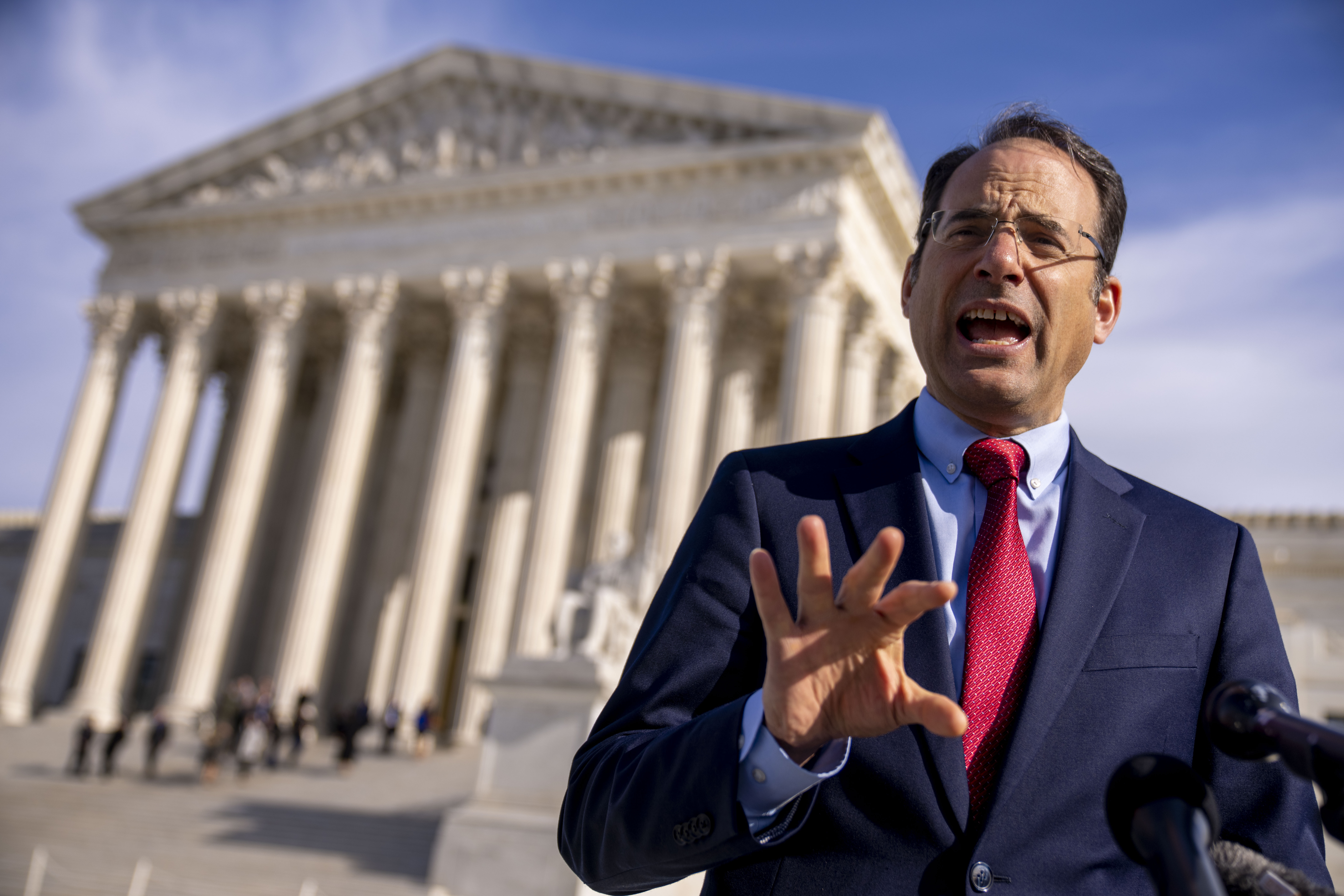 Colorado Attorney General Phil Weiser walks out of the Supreme Court in Washington, Monday, Dec. 5, 2022, after the Court heard the case 303 Creative LLC v. Elenis. The Supreme Court is hearing the case of a Christian graphic artist who objects to designing wedding websites for gay couples, that's the latest clash of religion and gay rights to land at the highest court. (AP Photo/Andrew Harnik)
Colorado Attorney General Phil Weiser walks out of the Supreme Court in Washington, Monday, Dec. 5, 2022, after the Court heard the case 303 Creative LLC v. Elenis. The Supreme Court is hearing the case of a Christian graphic artist who objects to designing wedding websites for gay couples, that's the latest clash of religion and gay rights to land at the highest court. (AP Photo/Andrew Harnik)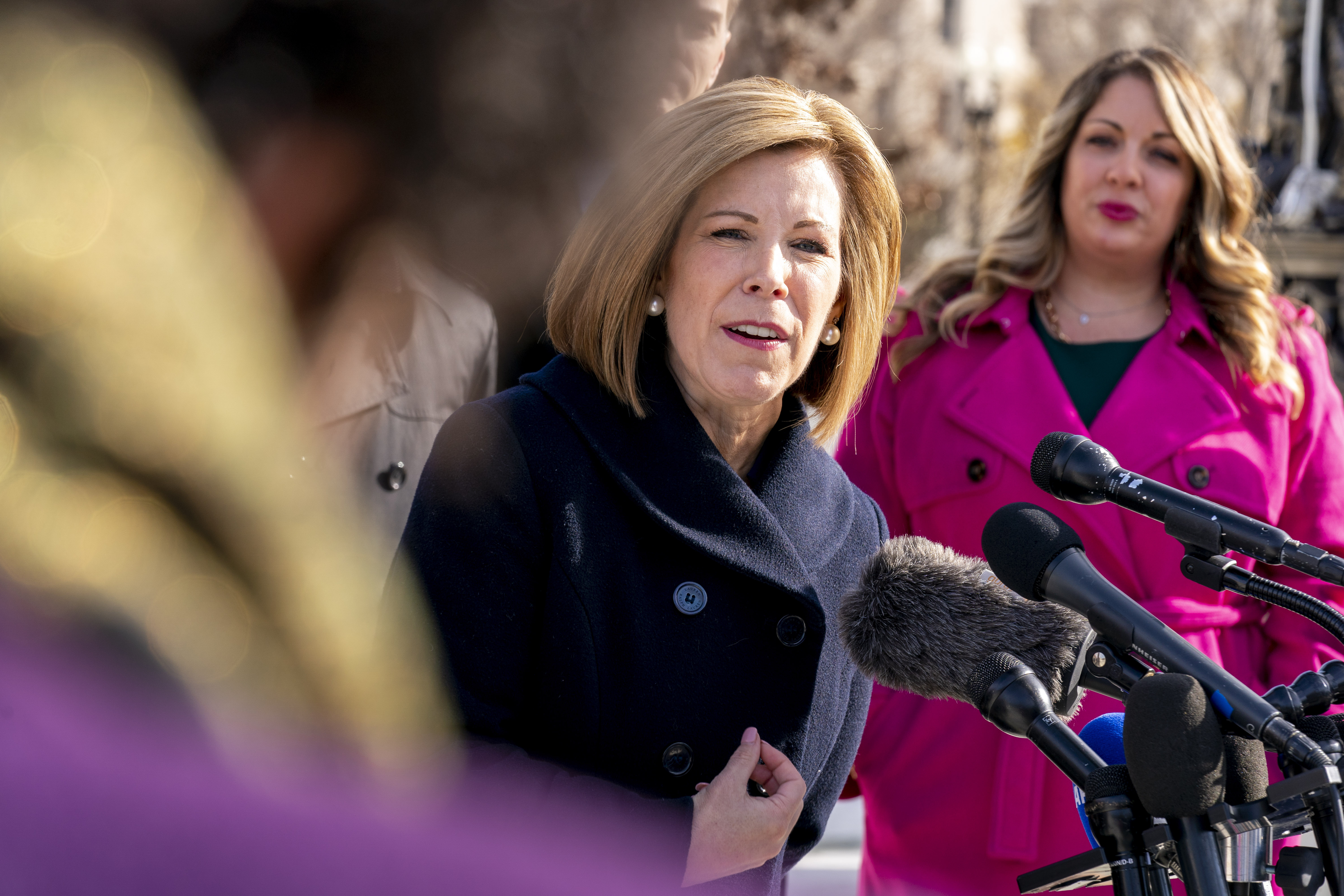 Lawyer Kristen Waggoner of the Alliance Defending Freedom, center, accompanied by by her client, Lorie Smith, a Christian graphic artist and website designer in Colorado, right in pink coat, speaks outside the Supreme Court in Washington, Monday, Dec. 5, 2022, after arguing before the Court. The Supreme Court is hearing the case of Smith who objects to designing wedding websites for gay couples, that's the latest clash of religion and gay rights to land at the highest court. (AP Photo/Andrew Harnik)
Lawyer Kristen Waggoner of the Alliance Defending Freedom, center, accompanied by by her client, Lorie Smith, a Christian graphic artist and website designer in Colorado, right in pink coat, speaks outside the Supreme Court in Washington, Monday, Dec. 5, 2022, after arguing before the Court. The Supreme Court is hearing the case of Smith who objects to designing wedding websites for gay couples, that's the latest clash of religion and gay rights to land at the highest court. (AP Photo/Andrew Harnik)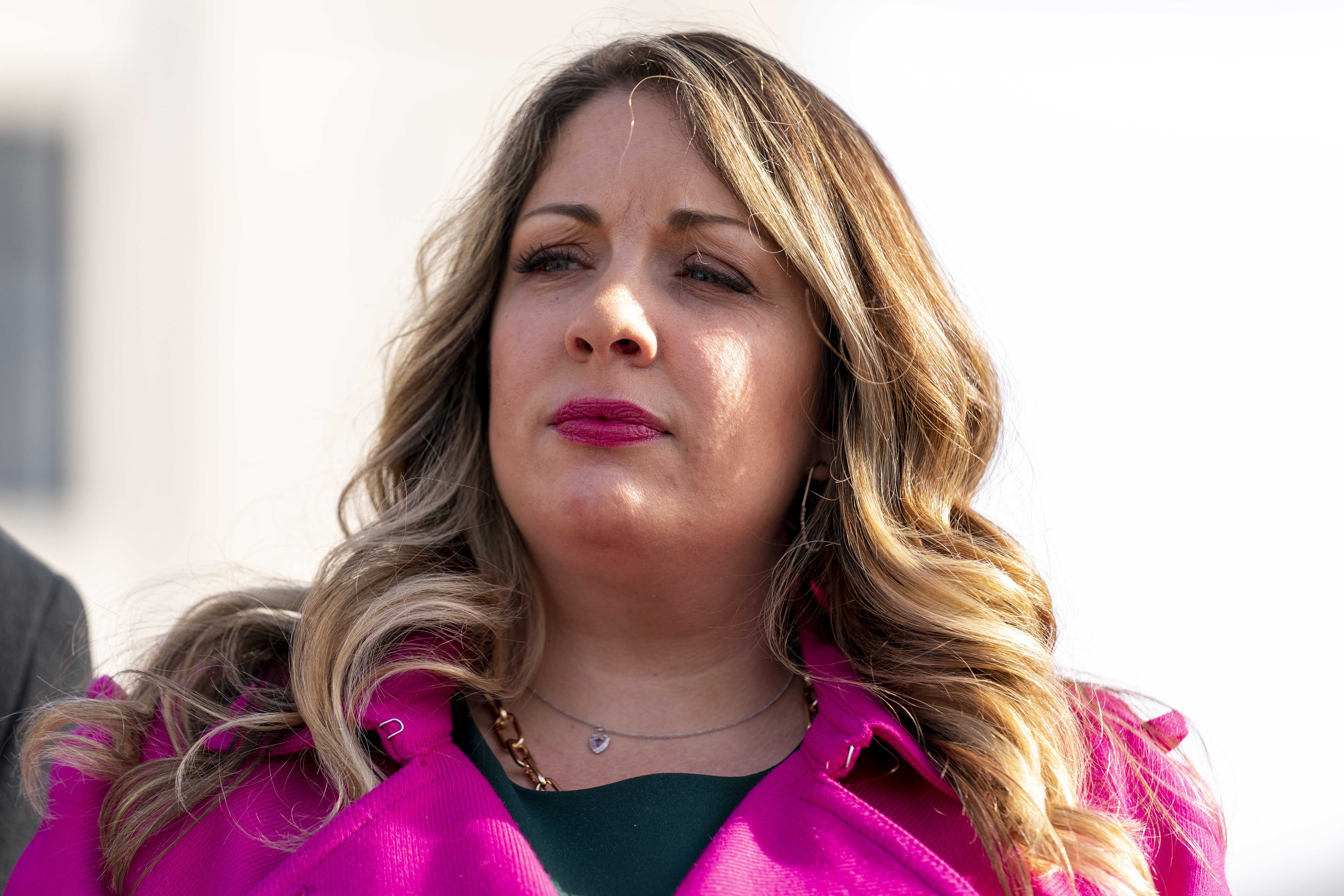 Lorie Smith, a Christian graphic artist and website designer in Colorado, appears outside the Supreme Court in Washington, Monday, Dec. 5, 2022, after her case was heard by the Court. The Supreme Court is hearing the case of Smith who objects to designing wedding websites for gay couples, that's the latest clash of religion and gay rights to land at the highest court. (AP Photo/Andrew Harnik)
Lorie Smith, a Christian graphic artist and website designer in Colorado, appears outside the Supreme Court in Washington, Monday, Dec. 5, 2022, after her case was heard by the Court. The Supreme Court is hearing the case of Smith who objects to designing wedding websites for gay couples, that's the latest clash of religion and gay rights to land at the highest court. (AP Photo/Andrew Harnik)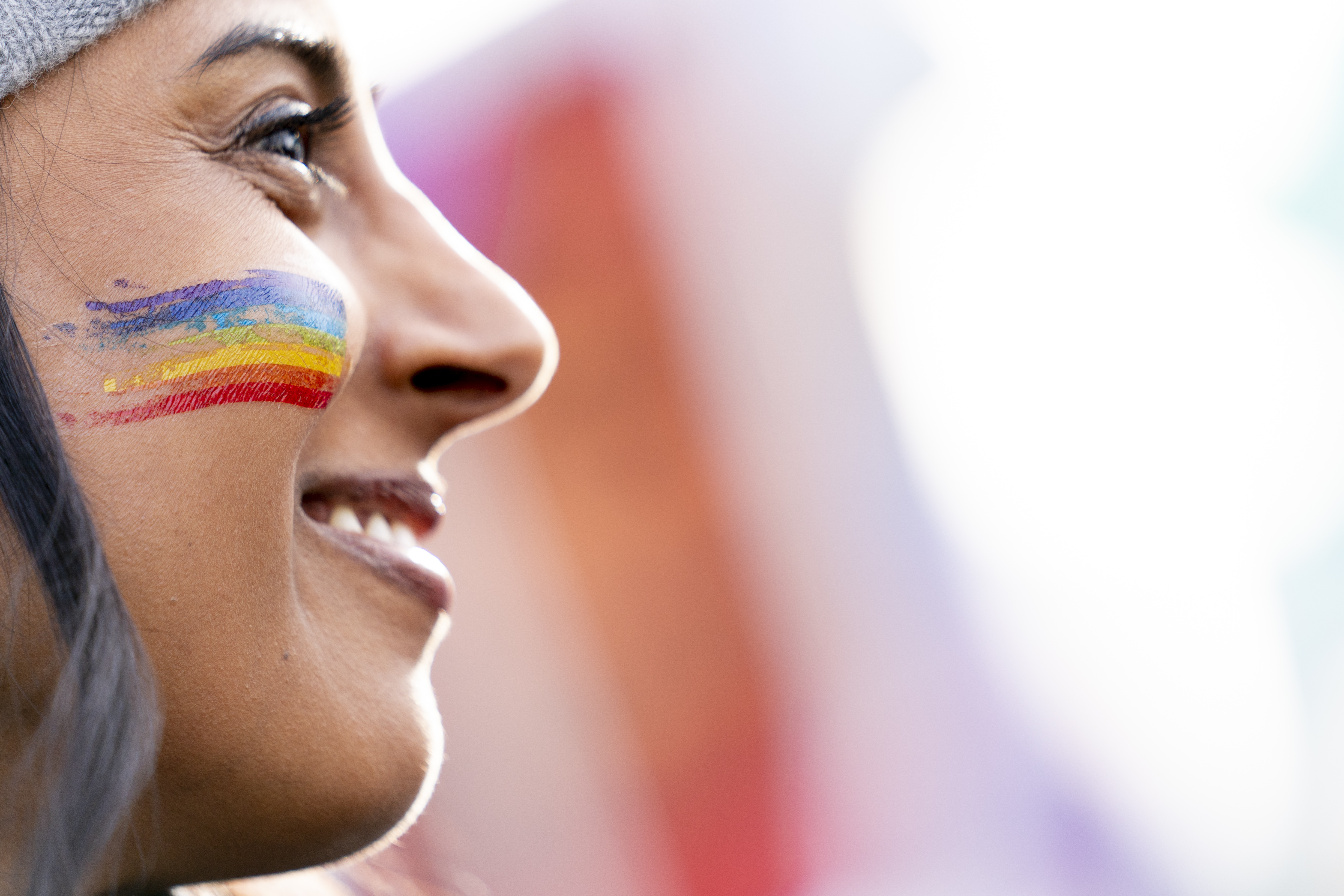 Pro-gay rights supporter Amrita Bhowmick stands outside the Supreme Court in Washington, Monday, Dec. 5, 2022. The Supreme Court is hearing the case of a Christian graphic artist who objects to designing wedding websites for gay couples, that's the latest clash of religion and gay rights to land at the highest court. (AP Photo/Andrew Harnik)
Pro-gay rights supporter Amrita Bhowmick stands outside the Supreme Court in Washington, Monday, Dec. 5, 2022. The Supreme Court is hearing the case of a Christian graphic artist who objects to designing wedding websites for gay couples, that's the latest clash of religion and gay rights to land at the highest court. (AP Photo/Andrew Harnik)
